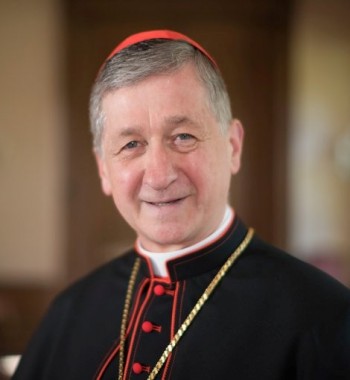Would Scalia have shifted on death penalty if he'd heard pope's decree? Maybe, Chicago cardinal says

Cardinal Blase Cupich/Archdiocese of Chicago.
Just hours after Pope Francis declared the death penalty “inadmissible” in all cases, Cardinal Blase Cupich of Chicago urged elected officials and leaders to recognize their responsibility and vested interest “in defending the sacredness and value of every human life.”
The timing of the pope’s declaration and the cardinal’s remarks proved serendipitous for an ABA panel discussion, “Has the Death Penalty Become an Anachronism? The Future of a System That Has Evolved in the Opposite Direction From Our Standards of Decency.” during the association’s annual meeting Thursday. The panel was sponsored by the ABA Section on Civil Rights and Social Justice.
Cupich, already a longtime opponent of the death penalty, said if U.S. Supreme Court Justice Antonin Scalia—a devout Catholic—had lived to hear the pope’s proclamation, he might have reconsidered his position supporting capital punishment.
The cardinal’s comment came in response to moderator Ronald J. Tabak, chair of the section’s Death Penalty Committee. He quoted Scalia as saying, “For the believing Christian, death is no big deal. Intentionally killing an innocent person is a big deal. It is a grave sin.”
Of Scalia, Cupich said: “I think that his understanding of salvation has great limitations. It’s an atavistic view of salvation, that is, as individuals.”
Panelists Karen Gottlieb, co-director of the Florida Center for Capital Representation at Florida International University College of Law, and Meredith Martin Rountree, a senior lecturer at Northwestern University Pritzker School of Law, described a history of the death penalty in the United States marked by racial disparities, unequal application and the execution of those later found to be innocent.
Public opinion about capital punishment has been shifting. Robert Dunham, executive director of the Death Penalty Information Center, cited polls in the mid-1990s that showed 80 percent of the public approved of the death penalty then, compared to a 55 percent approval rate today.
“It’s a consistent move in one direction: away from the death penalty,” he said. “As society’s attitude changes, the law changes with it.”
Dunham also said about a dozen innocent people have been executed since the reinstatement of capital punishment in the United States in the 1970s. “We have a problem,” he said. “If the death penalty has not become an anachronism, it has become an unreliable disgrace.”
Cupich said if we are to protect the sanctity of life for the least worthy, “we surely must protect those most vulnerable and most innocent,” adding, “We live in an era where the dignity of human life is threatened. Wherever we turn, we encounter mounting efforts to treat the lives of men and women as mere means to larger and allegedly more important goals.”
The pope’s change to the catechism counters previous teachings that the death penalty was appropriate in rare cases in which there was no other way to deterring a violent criminal.
“When the state imposes the death penalty, it proclaims that taking one human life counterbalances the taking of another life,” Cupich said. “This is profoundly mistaken.”
See also:
Chicago Sun-Times: “Cardinal Cupich wishes Scalia had lived to see pope’s new death penalty teaching”
Chicago Tribune: “Cardinal Cupich lauds Pope Francis’ revision to catechism barring death penalty”
Follow along with our full coverage of the 2018 ABA Annual Meeting.



